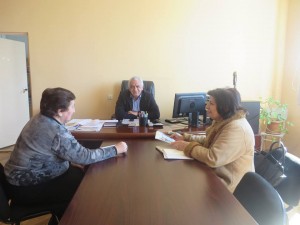In order to conduct monitoring and evaluation of “Conflict management education” project, Susanna Ghazaryan, WFD NGO education department officer made visits to several schools in Gyumri, that have been included in “Peace and conflict resolution education” project implemented by WFD NGO since 2005.
During those years changes have naturally taken place in many of the schools in regards to principals, vice-principles and class heads who worked and collaborated with WFD NGO. All the same, we were pleased to see that despite those changes all the methodical handbooks and posters provided by WFD NGO were kept in all those schools and were regularly used by the class heads. As assured by the principals and vice-principals, those themes are quite actual nowadays and the necessity of teaching them hasn’t decreased. Often are the cases when they refer to peaceful conflict management skills during the class-of-head hours. As A. Movsisyan, principal of school #9 mentioned, “Several generations were educated with those handbooks; learned the materials and I am sure those lessons did have their impact on children”.
Anna Harutyunyan, teacher at school #20 and ex-officer of “Peace education centre” stressed the importance of teaching conflict management education at school. “Though Peace education centre is not functioning at school today, I often make reference to our themes during my class-of-head hours, for I feel its importance all the time. I can say the same for the rest of the teachers who periodically conduct lessons in their classes. Those themes were tested even at the elementary level with positive outcomes. I can even bring an example where due to the election of the chairman of the board of pupils two close friends felt tensed towards each other but thanks to my experience in this field we were able to resolve the conflict”. By the words of A. Harutyunyan it would have been nice if the “Peace education centre” had restarted its activities in the school, where conflicts were solved not by the teachers, but by the trained pupils, because in this case pupils would trust their peers more and therefore the results would have been more obvious.
Gagik Karapetyan, head of school #7 in Gyumri, finds those trainings very effective too. He said they have periodically been referring to those themes until today. “The handbook, the materials available are chosen in such a way that they are interesting both for the teachers and the pupils. Even today class heads use the handbook with pleasure and not out of sheer necessity, which comes to prove the success of the handbook. All of us emphasise the importance of peace education, especially in high school where conflicts are much more and much obvious”.
It should be mentioned that the symbol fastened to the door of the “Peace education centre” is still there.
Almost all the principals and vice-principals of the 15 respondent schools assured that the “Conflict management education at schools” methodical handbook and posters are always on class heads’ hands, for conflicts are inevitable in our lives and we all should master the skills that help not to more aggravate the situation but find peaceful and constructive solution to the conflict and learn lessons.
Calenders of the contest “Let’s live in peace with our neighbours” published by WFD NGO were delivered to all the schools.
[fbalbum url=”https://web.facebook.com/media/set/?set=a.994346770639760.1073741955.158335984240847&type=3″]

